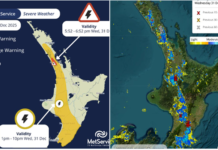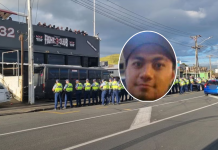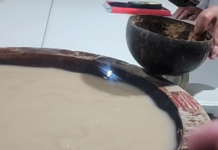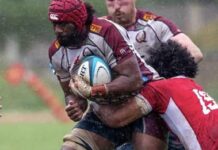Reverend Socratez Sofyan Yoman, on behalf of West Papuans
Words, photos, and interview by Todd Henry.Â
EDITOR’S NOTE: Todd Henry is a photographer and writer currently based in Auckland, New Zealand. He is originally from the USA, but has spent the past decade travelling extensively around the Pacific, and he has a great deal of interest in the past, present, and future of this region. When Todd isn’t covering stories from around the Pacific as a correspondent for the Kaniva Pacific, he enjoys studying the Tongan language, spending time with family, reading books about anthropology, and planning his next overseas trip.
Archaeological evidence tells us that the indigenous Melanesian people of the island of New Guinea have lived in these lands for over 40,000 years. In more recent times however, the nation of Indonesia has claimed sovereignty over the western half of the island, now known as West Papua. Indonesia obtained control of this region in 1969 through what has been described as a rigged voting initiative where a carefully selected group of West Papuans were essentially tricked into giving Indonesia lawful jurisdiction over the land. Indigenous West Papuans are currently subjects of Indonesia, a country that they share next to nothing in common with. There are increasing calls for West Papua to be granted independence, but this is not something that the Indonesian government is willing to negotiate at this point in time.
Relatively little information has made it out of West Papua due to an official ban on foreign journalists by the Indonesian government, but reports coming out describe a situation that is overwhelmingly dire for the West Papuans. Local accounts of unwarranted arrests, rapes, shootings, torture, murdered children, and even genocide at the hands of the Indonesian military and police are far too common.
Fortunately for the people of West Papua, the news of their plight is spreading through the help of concerned foreign leaders (including Tongan PM, ‘Akilisi Pohiva), a growing number of grassroots movements in various countries, and exiled West Papuans who make great sacrifices in order to raise international awareness for their cause. International support for the West Papuan people has been steadily gaining momentum, but many say that positive change must come before it is too late.
Reverend Socratez Yoman is a member of the indigenous Lani tribe of West Papua. He travels the world to speak on behalf of his people, and he is a pronounced representative of the West Papuan independence movement. Socratez recently visited New Zealand to give a series of presentations on the plight of the West Papuan people, and he was nice enough to take the time to answer some of my questions.
Read more stories by Todd Henry:
- Reverend Socratez Sofyan Yoman, on behalf of West Papuans
- Streetside Insights: Mathew Tamati Mokaraka
- Rarotonga’s Paradise Prison
- Dignitaries and Deportees: Coronation Time in Tonga

Todd: Reverend Socratez Sofyan Yoman, nice to meet you and I would like to thank you for doing this interview today. Can we just fill the readers in on who you are with some background information? Where are you from, and what is your personal story?
Socratez: Thank you Todd for your time, and for wanting to interview me. I was born in the highlands in West Papua on the 6th of June 1967. I grew up and went to primary school in my village, and for senior school I went to Nabire (a town in West Papua). After I finished senior high school I went to continue my studies at university, Cenderewasih University in Jayapura. I finished in 1994.
When I was back in my village I looked at my people’s situation, and saw the Indonesian military and police arresting my people. They were torturing and even killing. This is when I was in primary school. This is my own experience. When I went to the secondary school, it was a similar situation. I understood what was happening, and when I went to university I understood even more what is happening to my people in West Papua. I saw everyday how the Indonesian military and police attack my West Papuan people, arrested and tortured and then put them in prison, or killed them. I asked the question “why is this happening?†I realise that the Indonesians have occupied, or colonised West Papua. They are teaching Papuans everything Indonesian, Indonesian language, history, names, mountains, and heritage but they never teach about West Papuan cultures and history. I think they undermine West Papuans, they are killing all Papuan cultures and properties. This has been going on since 1963 until today, 2016, almost 53 years. We see also Indonesian military brutality on the people, on the behalf of the Indonesian territory’s insecurity.
This experience made me want to make it better. When I was in university I was always thinking about what we can do to help our people. I don’t know about the other students at university but this is what I was always thinking. This is an abnormal situation that is not good, and then I decided that I would go to study theology in West Java for one and a half years. After I finished, I went back to West Papua and I was elected as the General Secretary of the Fellowship Baptist Church of West Papua. I thought this was an opportunity to protect my people and speak out for my people because the church has values such as justice, peace, harmony, and respect for human dignity and human rights. The Bible says not to kill people, undermine people, or make people have a bad life. When I became secretary (in1998) I spoke out to oppose the human rights abuses, violations, and other atrocities happening in West Papua. In 2002 I was elected as the President of the Fellowship Baptist Church, and I got more chances to speak out for my people. Doing this is high risk, you know, because the Indonesian government is unhappy when we speak out and protect our people we go against them. Today I speak out to protect my people and make their lives better, better healthcare, education and economy.
Another problem faced by the Papuan people is that they have become marginalised on their own lands. They are hopeless and landless. Today, Indonesian migrants come in flocks and they are increasing in West Papua to become to majority in all sectors. They own all the businesses, shopping centres, restaurants, hotels, and public transportation are all owned by Indonesian migrants. The West Papuans are the owners of the land but they have become marginalised, and powerless. The people have been removed from their own lands for palm oil plantations. When they try to protect their lands they are stigmatised as being against the government, and against the law, and the people are arrested or shot and killed. Then the transmigrants from Indonesia settle these places. This is happening in West Papua.
It’s happening right now?
Yes, it is happening now. This is an atrocity.
I know a lot of countries in the Pacific region currently struggle with their own issues, but what makes the present situation in West Papua relevant? Why should the governments and the people of other Pacific nations worry about what is going on in West Papua?
 Yes, thank you. We get a lot of attention from our brothers and sisters in Melanesian and Pacific communities. For example, Vanuatu is a strong supporter of West Papua. The Solomon Islanders support West Papua, as well as the Tongans and the Kanaks (the indigenous Melanesian people of New Caledonia) because they are part of the Pacific community. They cannot be silent anymore when their brothers and sisters are dehumanised and colonised, and under the brutality of the Indonesian government. Now a lot of Melanesian and Pacific communities are concerned, especially Vanuatu and the Solomon Islands. They are with us 100%, the communities, church leaders, universities, and governments support West Papua. A lot of these groups in Vanuatu are united under one umbrella, The United Liberation Movement for West Papua (ULMWP) https://www.ulmwp.org/. The people of Fiji and Papua New Guinea, not the governments, but the people support West Papua and they have formed grassroots movements to help us. Recently 20 bishops from Papua New Guinea and the Solomon Islands visited West Papua, and they could see what is happening to their brothers and sisters in West Papua. They support us.
‘Akilisi Pohiva, the Tongan Prime Minister, is the only Polynesian leader who has publicly shown support for West Papua. He raised his concerns for the people West Papua at both the UN General Assembly in New York in 2015, and also at the House of Parliament in London in May of this year. What does this kind of support mean to the people who are currently being victimised in West Papua?
 Yes, I believe that the Tongan Prime Minister sees people as a humanitarian. These are humanitarian issues and he is concerned. He sees with his heart and knows it is not a good situation. As the leader of an independent state he should support West Papua and I think he is a good person and made a good decision. I am very happy. On behalf of my people I would like to say thank you to ‘Akilisi Pohiva. I think other countries should follow his example in speaking out for us. This isn’t just a problem of Melanesia, or Polynesia, we see the human beings, and humanity. West Papua’s humanitarian issues are a global concern.
You are currently in New Zealand giving talks in order to tell the story of the West Papuan people and raise awareness of the human rights issues there. What can people do right now, even people in Pacific nations such as Tonga, to show their support for the people of West Papua?
They should support the ULMWP, as they represent the West Papuan people. People can also put pressure on their own governments to speak out, and they can put pressure on the Indonesian embassies in each country by sending letters to encourage the Indonesian government and president to engage in genuine dialogue and peaceful negotiation with the ULMWP and Indonesian representatives. This can be mediated by a third party. The voices of people and their solidarity is very important because West Papuan people today understand that they aren’t alone anymore. They have solidarities and friends, brothers and sisters all over the world. I came here to build awareness, not only in Pacific communities, but in all of the communities, Maori people, church leaders and communities, universities, and parliament.
I was last in New Zealand 10 years ago, and the human rights issues (in West Papua) have only become worse than they were before. More people are still being killed. We need support and solidarity from the people all over the world, not only from Melanesian and Polynesian communities. These are humanitarian issues, and human rights issues. Peace and dignity of the people must be respected.
You can read the rest of the interview here:







